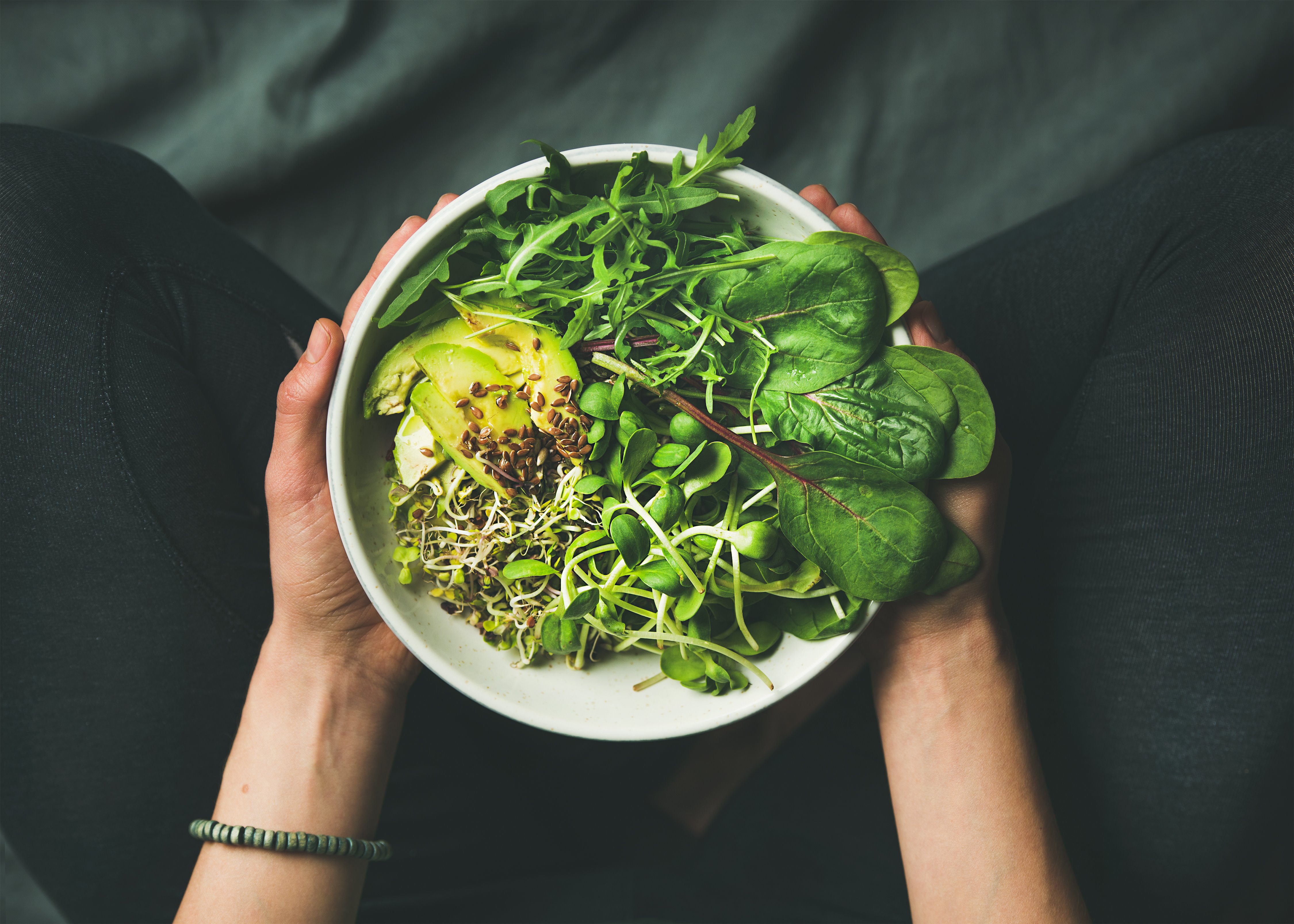If you’re following a vegetarian diet, your body may thank you for the nutrient-dense food you’re consuming daily — or maybe not. Many vegetarians eat a wider variety of fruits, vegetables, grains and legumes than non-vegetarians, but that doesn’t mean you’re getting everything you need for optim al health. Even the most attentive vegetarians could have some deficiencies in their diets.
Although most vegetarian diets are lower in fat, saturated fat and cholesterol than non-vegetarian diets, vegetarians can have nutritional gaps in a few important areas.1 Here are some common nutritional deficiencies in vegetarians, and how to make sure you get the nutrients you need.
Avoiding Vitamin B-12 Deficiency on a Vegetarian Diet
Vitamin B-12 is essential for healthy red blood cell formation and nerve function. Deficiencies can cause fatigue, weakness, loss of appetite, neurological changes and poor memory, among other symptoms.2 Since the only natural sources of vitamin B-12 are animal products, including meats, poultry, fish, eggs, milk and milk products, vegetarians can be at a higher risk of becoming deficient in vitamin B-12 than non-vegetarians.
You can supplement your vegetarian diet with vitamin B-12 fortified breakfast cereals, some nutritional yeasts, like fortified, vegan-friendly Nutritional Yeast Flakes and vitamin B-12 supplements.
Omega-3 Fatty Acids and Vegetarian Diet Deficiencies
Omega-3 fatty acids are among several essential fatty acids that we need to survive, yet our body can’t make them on its own.3 Vegetarians who avoid familiar omega-3 sources like eggs and fatty fish need alternate sources to get their daily fill. Walnuts, flaxseeds, chia seeds, canola oil, soybeans and tofu are all vegetarian-friendly sources of omega-3 fatty acids.
Along with omega-3 fatty acids, omega-6 and omega-9 fatty acids play important roles in maintaining bone health, brain function4 and reducing the risk of some diseases.5 Omega supplements can help you maintain a balanced ratio of omega-3, omega-6 and omega-9 fatty acids. For omega-3, consider Swanson Plant Based Omega-3 essential fatty acids supplement, which delivers the highest concentration of EPA and DHA available in a plant-based product. It was recently named 2018 Omega-3 Product of the Year by NutraIngredients USA!
Vegetarian Diet and Vitamin D Deficiency
Since we get most of our vitamin D from the sun, vitamin D deficiencies are not uncommon for people living in areas without a lot of sunshine during cooler months. Yet, vitamin D deficiencies are even more of a concern for vegetarians because many of the foods that are higher in vitamin D are animal products.
On a clear, sunny day, it only takes about 15 minutes of sun exposure a few times a week to get most of the vitamin D we need.6 But certain times of the year that’s easier said than done. Since vegetarian-friendly, vitamin D-rich foods are limited, plus you would need to eat a lot of them to get the recommended daily value, you might want to consider taking a vitamin D supplement when you’re not spending time in the sun or have skin or health sensitivities to consider.
Avoiding Calcium Deficiency on a Vegetarian Diet
Calcium plays an important role in your overall health, supporting the functions of your nerves, cells, muscles and bones. If you don’t get enough of it in your diet, your body can take calcium from your bones, making them weaker.8
If you’re a strict vegetarian, there are plenty of ways to fulfill your daily needs of calcium without consuming dairy products. Greens, such as spinach, kale and broccoli, are packed with bone-healthy calcium. Also, you can get calcium from some soybean products and legumes, and if you’re not sure that you’re getting enough, easily assimilated calcium citrate complex is available in capsule form.
Iron and Vegetarian Diet Deficiencies
There are two types of iron – the kind you get from eating meat (heme iron) and the kind you get from plant-based sources (non-heme iron). Since vegetarians don’t get any heme iron, and this type of iron is absorbed much more efficiently than non-heme iron, recommendations for vegetarians are 1.8 times more than iron recommendations for non-vegetarians.7
Vegetarian-friendly iron sources include some vegetables, nuts, beans, and fortified grain products like breads and cereals.
While vegetarians benefit from eating a lot of fresh fruits and vegetables, you still need to watch your intake of essential vitamins and nutrients, and perhaps consult with your physician or a nutritionist, to keep your diet balanced and to live a healthful and balanced life.
If you’re looking for more information on vegetarian diets, read Vegetarian Essential Fatty Acids and Can the Vegetarian Diet Get Complete Proteins?
Keep an eye on our blog for more health tips every week, or sign up for Swanson Health emails to have them delivered straight to your inbox.

About Lindsey Toth, MS, RD
Registered Dietitian, Swanson Health Products
Lindsey is a nationally recognized registered dietitian and nutritionist with a soft spot for ice cream. She empowers people to take charge of their health by finding the balance between the pleasure and nourishment in food.
Her philosophy is that you should take care of your body because it’s the only permanent home you have. It’s what inspired her to pursue a career in nutrition and, ultimately, led her to Swanson Health Products.
Sources
1 Vegetarian Diets. American Heart Association. http://www.heart.org/HEARTORG/HealthyLiving/HealthyEating/Vegetarian-Diets_UCM_306032_Article.jsp#.WfcgGhNSyu5 (Accessed 10/27/2017)
2 Vitamin B12 Dietary Supplement Fact Sheet. National Institutes of Health. https://ods.od.nih.gov/factsheets/VitaminB12-HealthProfessional/ (Accessed 10/27/2017)
3 The Essentials of Essential Fatty Acids. PubMed. https://www.ncbi.nlm.nih.gov/pubmed/22435414 (Accessed 10/27/2017)
4 Omega-6 Fatty Acids. University of Maryland Medical Center. http://www.umm.edu/health/medical/altmed/supplement/omega6-fatty-acids (Accessed 10/27/2017)
5 Omega-3, 6, and 9 and How They Add Up. University of Colorado. https://www.uccs.edu/Documents/healthcircle/pnc/health-topics/Omega-3_6_and_9_Fats.pdf (Accessed 10/27/2017)
6 Time for More Vitamin D. Harvard Health Publishing. https://www.health.harvard.edu/staying-healthy/time-for-more-vitamin-d (Accessed 10/27/2017)
7 Iron Dietary Supplement Fact Sheet. National Institutes of Health. https://ods.od.nih.gov/factsheets/Iron-HealthProfessional/ (Accessed 10/27/2017)
8 Drugs & Medications: Calcium Citrate 200 Mg (950 Mg) Tablet. WebMD. https://www.webmd.com/drugs/2/drug-8624/calcium-citrate-oral/details (Accessed 10/27/2017)
*These statements have not been evaluated by the Food and Drug Administration. These products are not intended to diagnose, treat, cure or prevent any disease.




